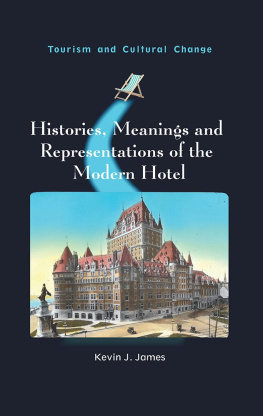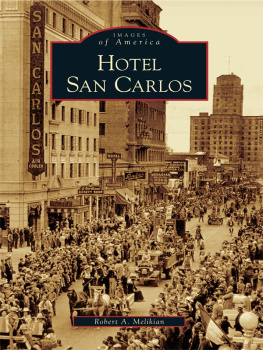A FREE MAN OF COLOR AND HIS HOTEL
Related Potomac Titles
Father of the Tuskegee Airmen, John C. Robinson, by Phillip Thomas Tucker
The Most Famous Woman in Baseball: Effa Manley and the Negro Leagues, by Bob Luke
My Life and Battles, by Jack Johnson, translated and edited by Christopher Rivers
One Marshals Badge: A Memoir of Fugitive Hunting, Witness Protection, and the U.S. Marshals Service, by Louie McKinney, with Pat Russo
A FREE MAN OF COLOR AND HIS HOTEL
Race, Reconstruction, and the Role of the Federal Government
CAROL GELDERMAN

Copyright 2012 Potomac Books, Inc.
Published in the United States by Potomac Books, Inc. All rights reserved. No part of this book may be reproduced in any manner whatsoever without written permission from the publisher, except in the case of brief quotations embodied in critical articles and reviews.
Library of Congress Cataloging-in-Publication Data
Gelderman, Carol W.
A free man of color and his hotel : race, Reconstruction, and the role of the federal government / Carol Gelderman. 1st ed.
p. cm.
Includes bibliographical references and index.
ISBN 978-1-59797-833-0 (hardcover : acid-free paper)
ISBN 978-1-59797-834-7 (electronic edition)
1. Wormley, James, 18191884. 2. Free African AmericansWashington (D.C.)Biography. 3. African AmericansWashington (D.C.)Biography. 4. HotelkeepersWashington (D.C.)Biography. 5. Wormley Hotel (Washington, D.C.) 6. Washington (D.C.)Biography. 7. Reconstruction (U.S. history, 18651877)Washington (D.C.) 8. Washington (D.C.)Race relationsHistory19th century. 9. African AmericansSegregationHistory19th century. 10. African Americans-Government policyHistory19th century. I. Title.
F198.W83G45 2012
647.94092dc23
[B]
2011041712
Printed in the United States of America on acid-free paper that meets the American National Standards Institute Z39-48 Standard.
Potomac Books
22841 Quicksilver Drive
Dulles, Virginia 20166
First Edition
10 9 8 7 6 5 4 3 2 1
CONTENTS
NOTE ON TERMS
Today, U.S. residents who are persons of color are commonly referred to as blacks or African Americans. During the time span of this book, as well as for a century and half before and more than a half a century after, the terms used were Negroes and colored people. I shall, in this book, mainly employ terms in use in the nineteenth century.
PREFACE
Near the end of the American Revolution, the thirteen former colonies joined together in a firm league of friendship and drew up the Articles of Confederation, a plan of government for the new United States of America that emphasized the sovereignty of each state. Because the Confederation Congress, made up of delegates from each of the thirteen states, had no power to tax or to settle disputes, even rebellion, it was utterly ineffective in governing the new Republic. The delegates decided that to preserve their young nation, they must revise the articles. Accordingly, fifty-five men from twelve of the original thirteen states (Rhode Island refused to send representatives) spent the hot summer of 1787 in Philadelphia forging a new plan of government. Out of these deliberations came the U.S. Constitution, wholly created by compromise in the ongoing disputes over the proper relationship between national and state power. Arguments over how to protect the interests of both small and large states, for example, nearly wrecked the convention. After delegates agreed on a plan that provided for equal representation in the Senate and representation proportionate to population in the House of Representatives, the big question left was how to count slaves in determining the number of congressmen a state should have.
The Northern states argued that slaves should not be counted. Southerners wanted to count all slaves. The convention compromised. Three-fifths of the slaves would be counted. Because this compromise gave the South a political advantage, slaveholding presidents governed the nation for fifty of its first seventy-two years. In another compromise between North and South, delegates agreed that the foreign slave trade could not be prohibited until 1808.
Constitutional compromise brought relative harmony, but not for long. By adding massive real estate to the country, the 1803 Louisiana Purchase brought the free-state/slave-state issue to a head. Although New York and New England had nearly sixty thousand more free inhabitants than did the entire slaveholding South, the South had thirteen more seats in the House of Representatives and twenty-one more electoral votes. If the Louisiana Territory were opened to slaves, this imbalance would increase. Every new state meant two more Senate votes and a proportional number of House votes. If new land equaled new states, the existing slave states wanted these new territories to become slave states as well. When Missouri applied for statehood in 1817, the slavery debate escalated.
Slavery proved to be impossible to contain within the system. This does not mean legislators did not try. They tried in 1820, they tried in 1833, and again in 1850; they tried yet again in 1854 with the Kansas-Nebraska Act, which allowed settlers of Kansas and Nebraska to vote on whether to allow slavery in the new states. In 1860 and 1861 eleven Southern states carried states rights to its most extreme by seceding from the Union: We, the people of the Confederate States, each state acting in its sovereign and independent character... do ordain and establish this Constitution for the Confederate States of America. During the Civil War, at Gettysburg, Lincoln spoke a mere 272 words that changed the nation forever. He connected the birth of the United States of America to the Declaration of Independence of 1776, rather than to the Constitution of 1787 with its implicit recognition of slavery, making it clear that America was one nation and not merely a collection of sovereign states. At the end of the Civil War, the Thirteenth Amendment officially abolished and prohibited slavery within the United States. During Reconstruction Congress passed the Civil Rights Acts of 1866 and 1875, declaring Negroes citizens and denying states the power to restrict their rights.
Lincolns revolutionary address at Gettysburg, in conjunction with Reconstructions three amendments, gave the country a fundamentally new constitution. The Thirteenth, Fourteenth, and Fifteenth Amendments abolished slavery and gave Negro males civil rights and the vote, and more important, established a national citizenship whose rights, enforced by the federal government, were to be enjoyed by all Americans. But the Supreme Court, beginning in 1873, progressively restricted the rights protected under these amendments. By the end of the century, the states had been given carte blanche to circumvent the Reconstruction amendments and the civil rights law. And so matters would rest until the middle of the twentieth century. It seems ironic that the Constitution explains in considerable detail the powers of Congress and the executive branch, while the article on the Supreme Court simply sketches the outline of a federal judiciary in three brief, succinct sections; and yet in three decisions in the 1870s this branch was able to undo the Reconstruction amendments. The brevity of the Constitutions discussion of the court notwithstanding, its power of judicial review was unquestioned. In 1803 Marbury v. Madison
Next page






